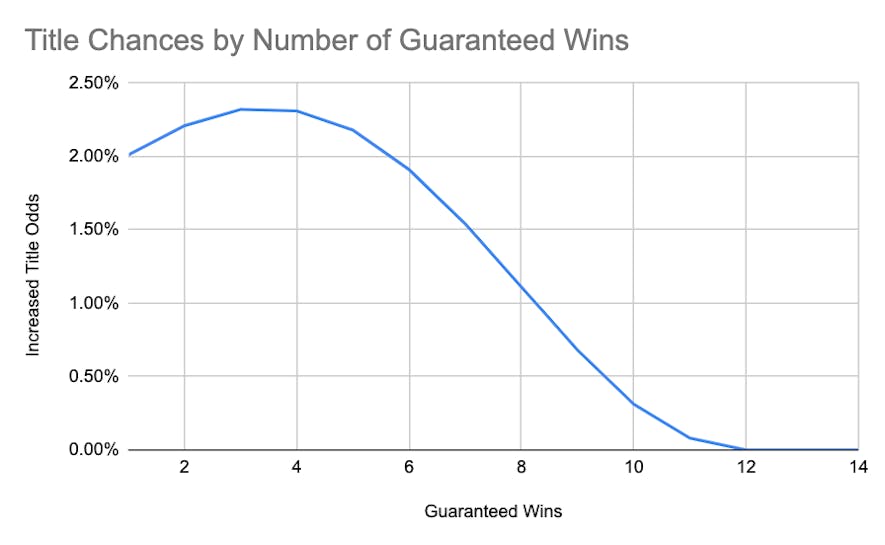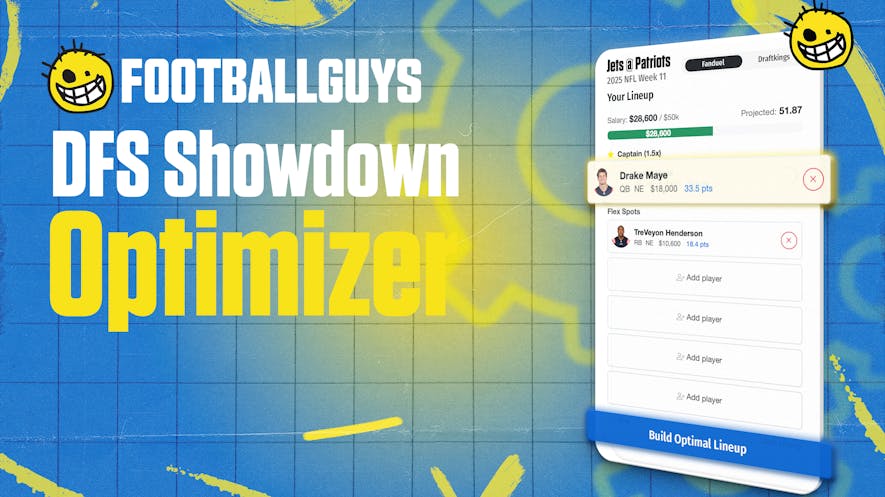There's a lot of strong dynasty analysis out there, especially when compared to five or ten years ago. But most of it is so dang practical-- Player X is undervalued, Player Y's workload is troubling, the market at this position is irrational, and take this specific action to win your league. Dynasty, in Theory is meant as a corrective, offering insights and takeaways into the strategic and structural nature of the game that might not lead to an immediate benefit but which should help us become better players over time.
Estimating the Impact of Win-Now Trades
Last week, we talked about the power of thinking carefully about a topic to find answers when you don't have the data or the resources to do research. I also discussed one of my favorite thought experiments-- estimating the value of a regular-season game relative to a playoff game in fantasy.
Based on my thought experiments, I calculated that in a typical 12-team league, posting the top weekly score in Weeks 16 or 17 would boost a team's naive title odds by over 8% (from 8.3% to 16.6%). The top weekly score in Week 15 would increase title odds by over 4% (from 8.3% to 12.5%). And I estimated that the top weekly score during a regular season week would likely result in a 1-2% boost to a team's title odds.
Then I built and shared a model to estimate championship odds based on expected weekly winning percentage so we could test these questions directly and found that with our baseline assumptions (including that all teams naturally had a 50% chance to win each week), a guaranteed regular-season win boosted title odds by 2%, to 10.3%.
It was nice to validate the original estimate, but I noted that the most powerful part of a model like this is we could easily change the default assumptions and test the impact of a host of factors. I ended last week with a few questions for you to carefully consider. Here's the list again:
- With our assumption that we had a 50% chance to win each game, taking the genie's offer (of a guaranteed win) in the wildcard round increased our title odds by 2.2% more than taking it in the regular season, while taking it in the finals was 6.3% better. If our default chances of winning each game were 70% instead, would the wildcard round become more advantageous, less advantageous, or remain the same? How about the finals?
- What if there were no bye weeks and only four teams made the playoffs? Would the finals week become more or less valuable compared to a random regular season week, or would its value remain the same?
- If the genie offered to guarantee a victory in two regular-season weeks, would that be twice as valuable?
- How many regular-season victories would he have to guarantee for it to become more valuable than a guaranteed high score during the championship week?
- Is it better to improve your chances of winning every game by 5% if you're starting with a 50% chance to win or if you're starting with a 60% chance to win? At what starting winning percentage would an extra 5% chance be most impactful?
- Who is more likely to win a championship, a team with a 50% chance to win every game or a team that alternates between a 30% chance to win and a 70% chance to win?
Now we're going to answer those questions. And then we're going to generalize those answers to address the big, important question: when is the most impactful time to make win-now trades in dynasty?
Answer #1
- With our assumption that we had a 50% chance to win each game, taking the genie's offer (of a guaranteed win) in the wildcard round increased our title odds by 2.2% more than taking it in the regular season, while taking it in the finals was 6.3% better. If our default chances of winning each game were 70% instead, would the wildcard round become more advantageous, less advantageous, or remain the same? How about the finals?
For a team with a 70% chance of winning each game, taking a guaranteed win during the regular season increases title chances by 1.67% (from 41.72% to 43.39%). Taking the same guaranteed win in the wildcard round increased title odds by 3.72%. The relative edge of the wildcard round went from 2.2% to 2.05%, which is a decline, but only a very small one, even though this team already has about a 2-in-3 chance of earning a bye and skipping the wildcard round entirely.
On the other hand, taking the guaranteed win in the championship game increases expected title chances by a whopping 17.88%, nearly 10% better than in the original "50% to win" scenario. For teams that are already great, the last two weeks of the season become significantly more valuable relative to the rest of the year.
Answer #2
- What if there were no bye weeks and only four teams made the playoffs? Would the finals week become more or less valuable compared to a random regular season week, or would its value remain the same?
In leagues with a playoff bye, the guaranteed regular-season victory increased title chances by 2.01%. In leagues without a bye, the guaranteed regular-season victory increased title chances by 2.21%. The guaranteed playoff victory remained equally valuable in both leagues, but the fewer teams make the playoffs, the more important each regular-season game becomes.
Answer #3
- If the genie offered to guarantee a victory in two regular-season weeks, would that be twice as valuable?
This is a deceptively tricky one. It might be tempting to use one of my favorite problem-solving strategies-- reductio ad absurdum. Comparisons that are difficult in the middle of the distribution often become simple at the extremes.
If the value of wins increased linearly, then going from one guaranteed win to two guaranteed wins would be just as good as going from 13 guaranteed wins to 14 guaranteed wins. But whether a team finishes 13-1 or 14-0, it is certainly going to earn the #1 seed and a first-round bye in the playoffs; the marginal value of that fourteenth win is zero.
Because the first guaranteed win has some marginal value and the last guaranteed win has no marginal value, we have demonstrated that not all wins are equally valuable. And since the last marginal win has no value, we might be tempted to assume that the marginal value of each additional win is less than the value of the win before.
But it's not! While the first guaranteed win increases your title odds by 2.01%, the second increases it by 2.21%, and the third provides an even bigger boost-- 2.31%. Here's the marginal value of each additional guaranteed win in the regular season.
What's going on here? It's the bye week. Earning that bye automatically doubles your chances of winning it all (assuming you are otherwise 50/50 to win each game). Based on historical rates, a team needs an expected record of 9-5 to have a 50/50 shot at the bye.
For a team with a 50% chance of winning each game to have an expected record of 9-5, it needs to start with four guaranteed wins already in the bank. So it makes sense that each guaranteed win that gets us closer to that goal is more valuable than the one that came before, and also that once we've hit that mark, each extra win becomes less valuable than the one before.
(Technically, because an 8-6 team is very slightly more likely to earn a bye than a 10-4 team is to lose the bye, the breakeven point is more like 8.9-5.1. This is why the fourth guaranteed win is imperceptibly less valuable than the third one, it pushes us just a hair past the true tipping point for the bye.)
Answer #4
- How many regular-season victories would he have to guarantee for it to become more valuable than a guaranteed high score during the championship week?
Continue reading this content with a ELITE subscription.
An ELITE subscription is required to access content for Dynasty leagues. If this league is not a Dynasty league, you can edit your leagues here.



